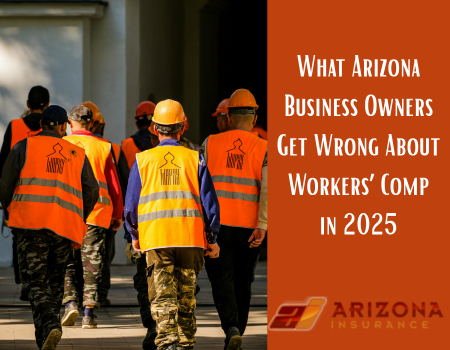Workers’ compensation has always been one of the trickiest aspects of running a business, especially for small and mid-sized companies. In Arizona, where industries like construction, healthcare, hospitality, and retail employ thousands, workers’ comp is not optional—it’s a legal requirement. Yet many Arizona business owners still misunderstand what workers’ compensation really involves, especially as new rules, costs, and workplace risks evolve in 2025.
Here are some of the most common misconceptions business owners in Arizona have about workers’ comp—and what you should know to stay compliant, protect your employees, and avoid costly mistakes.
 Myth #1: Only “Dangerous Jobs” Need Workers’ Comp
Myth #1: Only “Dangerous Jobs” Need Workers’ Comp
Many business owners assume workers’ comp only applies to industries like construction, mining, or trucking. But under Arizona law, nearly every business with employees—regardless of industry—must carry coverage.
The reality: Even office workers can suffer repetitive strain injuries, slip-and-fall accidents, or stress-related health claims. In fact, insurance carriers are reporting an increase in claims from non-traditional injuries like mental health conditions related to workplace burnout in 2025.
Failing to carry coverage—even if you think your workplace is “low risk”—can lead to fines of up to $10,000 per employee and even lawsuits.
Myth #2: Independent Contractors Don’t Need Coverage
In Arizona, misclassifying employees as independent contractors remains a common mistake. Many business owners assume that by calling someone a contractor, they don’t need to provide workers’ comp.
The reality: The Industrial Commission of Arizona (ICA) looks at the nature of the relationship, not the job title. If your contractor works primarily for you, uses your equipment, and follows your schedule, the state may consider them an employee. If they get injured, you could be on the hook for medical costs and penalties.
In 2025, enforcement has become stricter, with regulators focusing more on gig and contract-heavy industries like delivery, cleaning services, and home repair.
Myth #3: Workers’ Comp Premiums Are Fixed
Some Arizona business owners think workers’ comp premiums are non-negotiable or that they can’t influence costs.
The reality: Premiums depend on several factors, including payroll size, industry classification, and your company’s safety record. Businesses that invest in safety training, ergonomic equipment, and return-to-work programs often receive significant discounts.
Carriers in 2025 are offering more incentive-based programs for companies that adopt digital safety tracking tools, telemedicine, and employee wellness programs. Ignoring these opportunities means paying more than you should.
Myth #4: Small Businesses Can Skip Coverage
A dangerous misconception among Arizona’s small business owners is that if you only have one or two employees, you don’t need workers’ comp.
The reality: Arizona requires coverage for any business with one or more employees—even part-time staff. The only exception is if you are a sole proprietor with no employees, and even then, carrying voluntary coverage is highly recommended to protect yourself.
Skipping coverage can lead not only to fines but also personal liability. Without insurance, you may be forced to pay an injured worker’s medical bills directly out of pocket.
Myth #5: Workers’ Comp Covers Everything Automatically
Some employers believe that once they have insurance, every employee injury is automatically covered.
The reality: Workers’ comp only applies if:
- The injury happened in the course of employment.
- The worker was not under the influence of drugs or alcohol.
- The claim is reported within Arizona’s deadlines.
Business owners must also document incidents carefully. Poor record-keeping or late reporting can result in claim disputes, delays, or even denials.
Myth #6: Mental Health and Stress Claims Don’t Count
Historically, mental health claims were harder to prove under workers’ comp laws. But in 2025, things are changing. More cases in Arizona are recognizing stress-related conditions, PTSD (especially among first responders), and even workplace burnout as valid claims.
Employers who dismiss these risks may face unexpected claims and rising premiums. Proactive mental health programs and employee support services can reduce both liability and turnover.
What Arizona Business Owners Should Do in 2025
- Audit your workforce classifications. Ensure contractors and employees are correctly defined.
- Review your policy annually. Premiums may be adjustable if your payroll or risk level has changed.
- Invest in workplace safety. Simple improvements reduce accidents and costs long-term.
- Educate employees. Make sure staff understand how to report injuries promptly.
- Stay updated on law changes. Arizona continues to adapt its rules, especially around gig workers and mental health coverage.
Workers’ comp isn’t just a box to check for compliance—it’s a safety net for both employees and business owners. In Arizona, too many businesses still believe myths that could cost them thousands in fines, claims, or lawsuits.
By understanding how workers’ comp really works in 2025—covering all employees, applying beyond dangerous jobs, and extending into mental health—business owners can avoid mistakes, control costs, and build safer, more productive workplaces.
It’s not just about legal compliance. It’s about protecting your people, your business, and your peace of mind in Arizona’s evolving work landscape.
